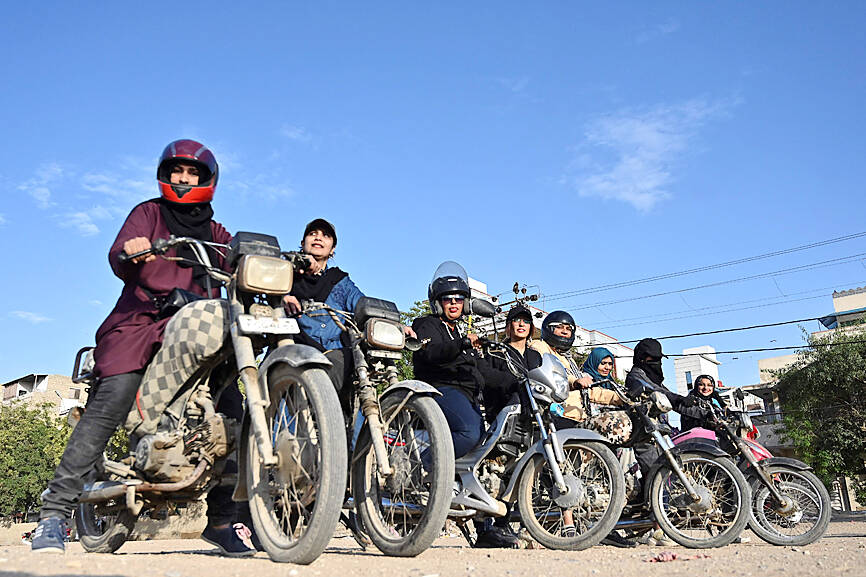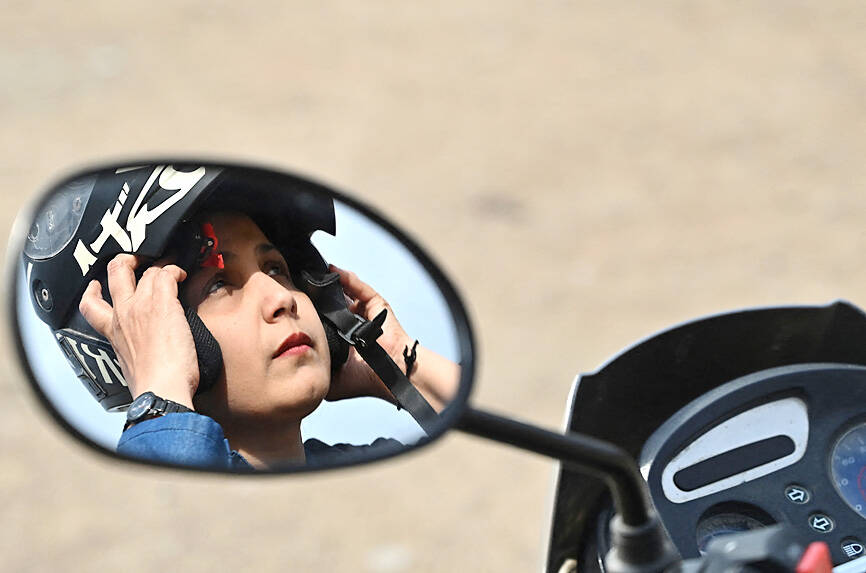Revving round a dusty oval in the heart of Pakistan’s largest city, women on motorbikes practice looping a row of safety cones, their helmets securing colorful headscarves in place.
It is a rare sight in Pakistan, where women are typically relegated to the back seats of cars or to riding side-saddle on motorbikes, ferried by a male relative.
“Change is under way,” said Zainab Safdar, demonstrating how to mount a two-wheeler while cloaked in a pink body-covering abaya.

Photo: AFP
The 40-year-old is an instructor for the Rowdy Riders, a women-only group teaching novices in Karachi everything from the basics of balancing on a bicycle to high-octane gear changing and negotiating traffic.
Since being founded in 2017 by a handful of pioneering riders, the self-described Rowdies have swollen in number to more than 1,500 housewives, students and professionals.
“In the past, there were misconceptions about girls riding bikes,” Safdar said, referring to doubts about their abilities. “Fortunately, with greater awareness, these notions have been dispelled.”

Photo: AFP
Women’s participation in the workforce is affected by the limited availability of public transport services that ensure their safety. In the sprawling megacity, granting women the skill and confidence to join legions of male bikers in the helter-skelter of congestion unlocks a new tier of freedom.
Most of the riders hail from Karachi’s middle class, but tradition often still holds sway.
University lecturer Shafaq Zaman said that “it took a while to get permission” from her family to start classes to master a pedal bike two months ago.
Among the few dozen bikers assembled under the mid-afternoon sun, she looks on with her seven-year-old daughter Aleesha as a convoy of women open up their engines and rip past in a haze of dust.
“I am so inspired that now I have my own dream for me, that I want to ride on a heavy bike. I want to ride the whole of Pakistan,” 30-year-old Zaman said.
Her story is not unusual. In Pakistan, very young boys are often seen steering motorbikes, but many of the Rowdies did not learn to ride a bicycle until well into adulthood.
“There should be a bike in every house and usually there is, but it’s rotting because men do not use it and women don’t know how to,” Sana Kamran said.
“If women can manage household responsibilities and earn a living, why can’t they ride a bike for their convenience?” the 41-year-old asked.
Motorbikes are ubiquitous across Pakistan — most commonly red Honda models or cheaper Chinese reproductions, considered capable of mastering any terrain.
The quest to conquer a bike has seen 26-year-old Farwa Zaidi sustain multiple bone fractures — but the injuries are a badge of honor she wears as proudly as the Rowdy Riders crest on her jacket.
“Here I am, standing strong,” she said alongside her electric scooter.
At 1.37m tall, Zaidi said her small stature made it difficult to claim a spot on crammed city buses.
Learning to ride gave her a new sense of possibility, she said.
“Once we master cycling, it instils a new-found confidence in our ability to conquer other challenges,” she added.

END OF AN ERA: The vote brings the curtain down on 20 years of socialist rule, which began in 2005 when Evo Morales, an indigenous coca farmer, was elected president A center-right senator and a right-wing former president are to advance to a run-off for Bolivia’s presidency after the first round of elections on Sunday, marking the end of two decades of leftist rule, preliminary official results showed. Bolivian Senator Rodrigo Paz was the surprise front-runner, with 32.15 percent of the vote cast in an election dominated by a deep economic crisis, results published by the electoral commission showed. He was followed by former Bolivian president Jorge “Tuto” Quiroga in second with 26.87 percent, according to results based on 92 percent of votes cast. Millionaire businessman Samuel Doria Medina, who had been tipped

ELECTION DISTRACTION? When attention shifted away from the fight against the militants to politics, losses and setbacks in the battlefield increased, an analyst said Recent clashes in Somalia’s semi-autonomous Jubaland region are alarming experts, exposing cracks in the country’s federal system and creating an opening for militant group al-Shabaab to gain ground. Following years of conflict, Somalia is a loose federation of five semi-autonomous member states — Puntland, Jubaland, Galmudug, Hirshabelle and South West — that maintain often fractious relations with the central government in the capital, Mogadishu. However, ahead of elections next year, Somalia has sought to assert control over its member states, which security analysts said has created gaps for al-Shabaab infiltration. Last week, two Somalian soldiers were killed in clashes between pro-government forces and

Ten cheetah cubs held in captivity since birth and destined for international wildlife trade markets have been rescued in Somaliland, a breakaway region of Somalia. They were all in stable condition despite all of them having been undernourished and limping due to being tied in captivity for months, said Laurie Marker, founder of the Cheetah Conservation Fund, which is caring for the cubs. One eight-month-old cub was unable to walk after been tied up for six months, while a five-month-old was “very malnourished [a bag of bones], with sores all over her body and full of botfly maggots which are under the

BRUSHED OFF: An ambassador to Australia previously said that Beijing does not see a reason to apologize for its naval exercises and military maneuvers in international areas China set off alarm bells in New Zealand when it dispatched powerful warships on unprecedented missions in the South Pacific without explanation, military documents showed. Beijing has spent years expanding its reach in the southern Pacific Ocean, courting island nations with new hospitals, freshly paved roads and generous offers of climate aid. However, these diplomatic efforts have increasingly been accompanied by more overt displays of military power. Three Chinese warships sailed the Tasman Sea between Australia and New Zealand in February, the first time such a task group had been sighted in those waters. “We have never seen vessels with this capability